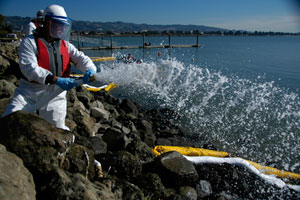Wednesday marks the six-month anniversary of the start of the BP oil spill, and even though Interior Secretary Ken Salazar announced last week that the Gulf was once again “open for business,” we still don’t know exactly why the disaster occurred in the first place, or what its long-term impacts will be.
Roughly half of the 4.9 million barrels of oil is still out in the Gulf, and there’s a raging debate in the scientific world about where exactly that oil is right now—though there are indications that much of it is floating in undersea plumes, accumulating on the sea floor, and still washing ashore in some areas. There are also reports that the oil is not breaking down as fast as some initially estimated.
The Obama administration has also faced criticism for underestimating the size of the disaster and misrepresenting reports about the fate of the oil. And even as a draft report from the oil spill commission highlighted the lack of planning for the use of dispersants, there has yet to be an overhaul in policy regarding the chemicals at the EPA—which has some environmental and community groups to sue the agency.
It’s also still unclear how much money BP will have to shell out in penalties, and where that money will go. Ray Mabus, secretary of the Navy and head of the restoration planning effort, has suggested that most of the money should go directly back to the Gulf, but Congress will need to act in order for that to happen.
Meanwhile, many victims of the spill are still struggling to cope. Washington Post and the Wall Street Journal have pieces today looking at the Gulf Spill Fund and the difficulties it has faced in doling out the emergency compensation that folks in the Gulf so desperately need. While the fund has given out $1.49 billion to date, many claimants are still waiting for their checks to arrive.
It’s also worth noting that, despite a disaster of unprecedented scale, lawmakers still have not taken action in response to the spill. The House passed a spill response bill, but like many pieces of legislation, it died a quiet death over in the Senate. The package would strengthen regulation of offshore drilling, eliminate the cap on liability for oil companies that cause spills, and block companies that repeatedly violate the rules from obtaining new leases, among other important overhauls of the industry. But for now, we won’t know the fate of the legislation until after the Nov. 2 elections.
The lack of urgency in the Senate has left many environmental groups anxious. “If the explosion of an oil rig that leaves eleven people dead and results in the worst oil spill in our country’s history, devastating Gulf of Mexico communities and wildlife, does not move the Senate to act, what will it take?” said Jamie Rappaport Clark, executive vice president of Defenders of Wildlife. “It’s been six months since the BP oil disaster began and the Senate has done nothing to improve even the most basic safety and response standards.”
Environmental groups have taken to the courts to force change, with the latest suit taking on BP for violating the Endangered Species Act by causing “ongoing unlawful harm or killing of endangered and threatened wildlife.” The suit, from Southern Environmental Law Center, Defenders of Wildlife, Gulf Restoration Network, and Save the Manatee Club, notes that at least 27 endangered or threatened animal species live in the Gulf region, including five species of endangered sea turtles and four species of endangered whales.
The BP disaster has faded from the headlines, but there’s still plenty of questions to answer and concerns that remain unaddressed.









